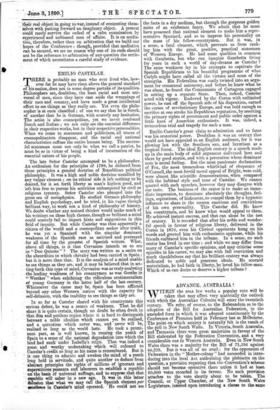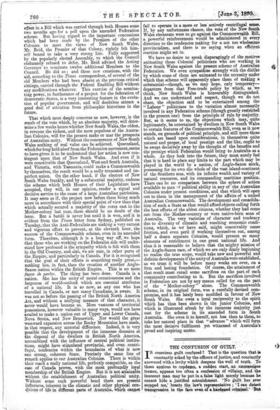ADVANCE, AUSTRALIA !
WITHIN the next few weeks a popular vote will be taken that may affect very materially the outlook with which the Australian Colonies will enter the twentieth century. We refer, of course, to the Referendum as to the adoption of the Bill for Australian Federation, in the amended form in which it was adopted unanimously by the Conference of Premiers held in February last at Melbourne. The point on which anxiety is naturally felt is the result of the poll in New South Wales. In Victoria, South Australia, and Tasmania there were great majorities in favour of the Bill elaborated by the Federation Convention, and a very considerable one in Western Australia. Even in New South Wales there was a majority for the Bill of 71,596 against 66,228. But it was all of no avail ; for the opponents of Federation in the " Mother-colony " had succeeded in intro- clueing into the local Act authorising the plebiscite on the question, a provision requiring that the Convention's scheme should not become operative there unless it had at least 80,000 votes recorded in its favour. No such provision attaches to the vote shortly about to be taken. The Council, or Upper Chamber, of the New South Wales Legislature, insisted upon introducing a clause to the same effect in a Bill which was carried through both Houses some two months ago for a poll upon the amended -Federation scheme. But having, regard to the important' concessions which had been made by the Premiers of ' the other COlonies to meet the views of New South' Wales, Mr. Reid, the Premier of that Colony, rightly felt him- self bound to take a very strong line. Fully supported by the popularly elected Assembly, to which the Council obdurately refused to defer, Mr. Reid adVised the Acting Governor to nominate twelve additional Members to the Council. He did so ; and these new creations, with the aid, according to the Times correspondent, of several of the old Members who had been absent at the previous critical sittings, carried through the Federal Enabling Bill without any modifications whatever. This exercise of the nomina- ting power, in furtherance of a project for the federation of democratic States, is a very interesting feature in the evolu- tion of popular government, and will doubtless attract a goad deal of attention from philosophic historians in the future.
That which most deeply concerns us now, however, is the result of the vote which, by an absolute majority, will deter- mine a few weeks hence whether New South Wales, the oldest, in revenue the richest, and the most populous of the Austra- lian Colonies, will for the present make or mar the prospects of Australian unity. Without the concurrence of New South Wales nothing of real value can be achieved. Queensland, which for long held aloof from the Federation movement, seems to have given it to be understood that her action is now con- tingent upon that of New South Wales. And even if it were conceivable that Queensland, West and South Australia, and Victoria, with Tasmania, could make a Commonwealth by themselves, the result would be a sadly truncated and im- perfect Union. On the other hand, if the electors of New South Wales frankly; and by a substantial majority, endorse the scheme which both Houses of their Legislature have accepted, they will, in our opinion, render a signal and decisive service to the cause of a large Australian patriotism. It may seem as if, the project now before them being much more in accordance with their special point of view than that which actually secured a majority of • the _votes cast in the Mother-colony last year, there should be no doubt of the issue. But a battle is never lost until it is won, and it is evident from the Times letter from Sydney, published on Tuesday, that the Anti-Federalists are making a very earnest and vigorous effort to prevent,. at the eleventh hour, the success of the Commonwealth scheme, even in its *amended form. Therefore, although it is, a long way off; we hope that those Who are working on the Federalist side will under- stand how profound is the sympathy which is felt with them in the Old Country, and. also, we are sure, in other parts of the. Empire; and-particularly in Canada. For it is recognised that the goal of their efforts is something really great,— nothing less, in fact, than the creation of another Anglo- Saxon nation within the British Empire. - This is no mere Pon de parler. The thing has been done. Canada is a nation. She has the unity of moral consciousness and the largeness of world-outlook which are essential attributes of a national life. It is so now, as any one who has travelled in Canada, or met many Canadians, is aware. It was not so before the passing of the British North America Act, and without a unifying measure of that character, it never would have become so. Mere vastness of territorial possessions, however valuable in many ways, would not have availed to make a nation out of Upper and Lower Canada, Nova Scotia, and New Brunswick. Nor would the great westward expansion across the Rocky Mountains have made, in that respect, any material difference. Indeed, it is very possible that the development of the immense domains at the disposal of the dwellers in British North America, nncombmed with the influence of central political institu- tions, might have stimulated provincial,. and• even-centri- fugal, tendencies within the boundaries of what is now one strong, coherent State. Precisely the same line .of remark applies to our Australian Colonies. There is within their reach a really national life, perfectly compatible, as the case of Canada proves, with the most profoundly, loyal membership of the 'British Empire. But it is not attainable without the establishment of Australian political unity. Without some such powerful bond there are present influences, inherent-in the climatic and other physical con- 4itions of life in different parts of ,flustralia, winch cannot fail to operate in a more or less actively centrifugal sense. If, by any unfortunate chance, the vote of. the New South Wales electorate were to go against the COMMOMNiltil Bill, a. powerful reinforcement would be administered in every direction to the tendencies making for a not too wholesome provincialism, and there is no saying . when an efficient reaction might set in. . .
We have no desire to speak disparagingly .of the motives animating those Colonial politicians who are working in New South Wales against the present scheme of Australian Federation. We even sympathise-strongly with the dislike by which some of them are animated to th.e necessity under which that scheme will apparently place them of malting a substantial—though, as we may hope, only temporary— departure from that , Free-trade policy by which, as :we think, New South Wales is honourably distinguished. And we can understand and respect, though we do :not share, the objection said to be entertained among the " Labour " politicians to the variation almost necessarily involved in any Federation scheme (though greatly restricted in the present one) from the principle of rale by majority. But; as, it seems to us, the objections which may, quite legitimately, be entertained 'by dwellers in New South Wales to certain features of the Commonwealth Bill,' even as it now stands, on grounds of political principle, and dill more -those which are based upon considerations, in themselves . quite natural and proper, of local prestige and the like, ought' to be swept decisively away by the thought of the benefits and the prestige which- Federation would bring. to Australia as a whole. As they look into the future, they must surely feel that it is hard to place any limits to the part which may be played in the world ' by a nation,. of Anglo-Saxon stock, possessing for its own the whole of the vast island-continent of the Southern seas, with its infinite wealth and variety of natural resources, and its commanding maritime position. Therecan be no comparison between the sphere of action available to men of political ability in any of the Australian Colonies under present conditions, and that which will open out to them in the management of the affairs of a united Australian Commonwealth. The development and consolida- tion of such a State as that would affOrd objects calling forth the best efforts of the ablest citizens, whether they had come out- from the, Mother-country or were native-born sons' of Australia. The very varieties of character and tendency due to diversity of climatic and resulting economic condi- tions, which, as we' have. said,' might conceivably' cause friction, and even peril if working themselves out, among half a dozen separate Colonies, would present so many elements of enrichment in one great national life. • And thus it is reasonable to believe that the mighty mission of the Anglo-Saxon race, of which we are only dimly beginning to realise the true scope, would take new and powerful and definite developments if the unity of Australia were established, as we trust it will be before many weeks are over, on a firm and lasting foundation. Of course, the attainment of that result must entail some sacrifices on .the part of each community contributing to it. But the sacrifices invoked in Federation are not by any means called for on the part of the " Mother-colony " alone. The Commonwealth scheme, in its original form, was a carefully devised com- Sromise, and it has lately been modified in favour of New outh Wales. She owes a loyal reciprocity to the spirit which has thus been shown in the junior Colonies, and which is illustrated afresh by the immense majority just cast for the scheme in its amended form in . South Australia. She owes it to herself, not. less than to them, to take her natural place in that " advance " which will form the most decisive fulfilment yet witnessed of Australia's proud and inspiring motto.







































 Previous page
Previous page